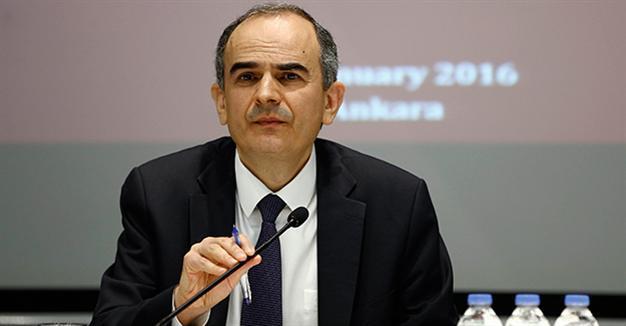Turkey’s Central Bank hikes inflation forecast to 7.5 percent for 2016, didn’t revise target at 5 pct
ANKARA

AA Photo
The Turkish Central Bank has increased its inflation forecast rate by one point from 6.5 to 7.5 for 2016, having kept its “5 percent target” for the following three years.“Inflation will likely stabilize around 5 percent as of 2018 after falling to 7.5 percent in 2016 and to 6 percent in 2017,” Central Bank Governor Erdem Başcı said in a meeting to launch the first Inflation Report of the Year on Jan. 26.
“Annual inflation increased in the fourth quarter of last year due to the ongoing rise in food prices as well as the lagged effects of the Turkish Lira depreciation throughout 2015. The upcoming inflation outlook is expected to depend on both the volatility in energy and unprocessed food prices and the effects of the global market uncertainty on inflation expectations. In addition, the large adjustment made to net minimum wages for 2016 will have an impact on inflation. Therefore, inflation is expected to remain elevated for some time. At this juncture, in addition to maintaining a tight monetary policy stance, fighting against the structural elements of inflation also remains important,” said the Central Bank in its report.
The inflation was announced at 8.81 percent in 2015, much higher than the Central Bank’s target at 5 percent. Başçı will reportedly explain why the bank’s 2015 inflation target was missed in a letter to Deputy Prime Minister Mehmet Şimşek.
This is the fifth time the bank was unable to achieve its target inflation rate under Başçı.
“The Central Bank will tell the government in a letter that a collective effort is needed to lower inflation as the government has already been quite aware of this,” Başçı said.
Şimşek, in charge of the economy, has said battling inflation will be this year’s main challenge.
Başçı said the inflation rate needs to fall below 7.5 percent levels by the end of this year.
“Turkey will face a far worse situation if it doesn’t start lowering inflation,” he said.
“We will use all existing tools that we have in a bid to approach the 7.5 percent forecast in the end of the year,” pledged Başçı, underlining they would “pay a great effort” to avoid double-digit inflation numbers in the first quarter of this year.
Revision in food price assumptions
“It is impossible to say that price stability is achieved, at this point. We have dropped our oil price forecasts from $54 to $37 for 2016. Assumed inflation for food prices was revised upwards from 8 percent to 9 percent for 2016 due mostly to the effects of minimum wage adjustments on costs and demand. The Food Committee has addressed red meat and bread prices, on which we expect a statement. A real will exists on this issue,” Başçı said.
Başçı also said it was too early to shift to single interest rate and suggested adjustments though daily liquidity policies, until uncertainties were eased.
“Single interest rate could be reconsidered if global uncertainties ease,” he said.
The Central Bank uses an “interest rate corridor” to control money supply in its struggle to reduce high inflation, with marginal funding rate as the ceiling rate at 10.75 percent and borrowing rate as the base rate at 7.25 percent, besides the policy rate, which is at 7.5 percent currently.
“Uncertainties surrounding global monetary policies and concerns over global growth cause financial markets to remain volatile. Thus, portfolio flows to emerging market economies and risk indicators follow a highly volatile pattern. Exchange rates also display a quite fluctuating course. The Central Bank assesses that the policy tools laid out in the road map announced in August 2015 strengthen the resilience of the economy against global shocks,” said the inflation report.
















